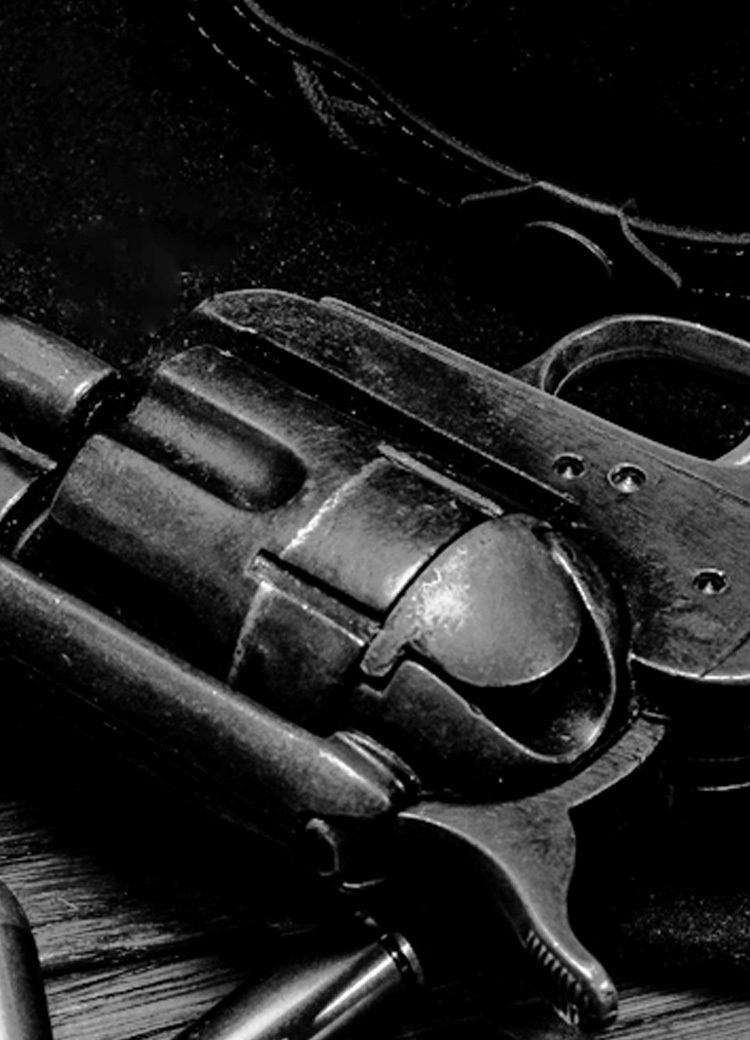Local history: library, lottery & murder shocked Topeka
The skeleton in our closet
The early history of the library is full of uplifting stories of ingenuity, persistence, and community-building. Yet, there were a few bumps in the road, some bigger than others. In 1876, a scandal involving the library rocked Topeka. It threatened to tarnish the institution’s reputation forever and even led to murder.
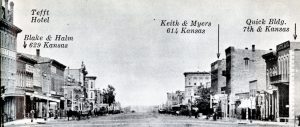
Kansas Avenue in 1876, looking north from 7th. Library was housed on the 2nd floor of the Quick Building.
By 1875, the Topeka Library Association (the predecessor to today's library) had grown from a small collection of books that occupied shelves at a local furniture store, to holding more than 1,700 volumes at their new location on the second floor of the Quick Building on the northeast corner of 7th and Kansas Avenue.
At that time, the library was not free. Only people who purchased a membership could check out books from the library. The money from memberships went toward operating expenses and buying more books. As the library grew, the money from memberships wasn't enough and the Library Association had to regularly hold fundraising events to cover expenses.
New library benefactor?
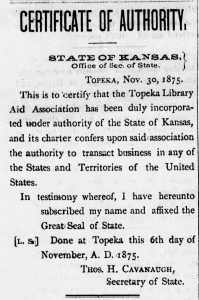
Notice of incorporation for the Library Aid Association, published in the fake newspaper, the Topeka Herald (Dec. 1, 1875)
In December 1875, a new, supposed benefactor for the library appeared on the scene. Local papers announced the creation of the Topeka Library Aid Association, a new private corporation formed with the stated purpose of accumulating funds:
for the purpose of endowing the Topeka Library Association and to purchase additional books […] by means of this corporation giving Public Literary or Musical Entertainments or Fairs, and to award or distribute by gift or lot to the patrons of the entertainment a portion of the proceeds arising from the sale of tickets of admission.
What the Library Aid Association was advertising was a lottery. Lotteries had been a popular way of raising money, especially for churches, schools and libraries. Lotteries helped create Faneuil Hall in Boston, as well as Princeton and Harvard Universities. But by the time the Topeka Library Aid Association was created, most people saw lotteries as scams. Lottery managers would advertise themselves as existing to help fund a worthy cause, but would pocket most of the profits.
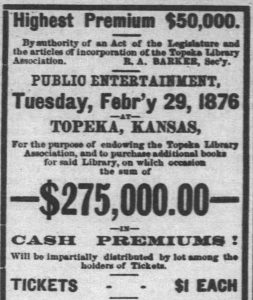
One of the many ads for the Library Aid Association's Grand Fair, at which the lottery drawing would be held (Topeka Weekly Commonwealth, Feb. 17, 1876)
Despite lotteries less-than-stellar reputation, several prominent Topeka citizens and businesses supported the Library Aid Association. The organization boasted a former Kansas Secretary of State, the Deputy State Treasurer, and the Treasurer for the City of Topeka as supporters. Both local and national papers published large advertisements for the first Aid Association Grand Fair to be held Feb 26, 1876, with $100,000 cash premiums, amounting to $275,000. The grand prize would be $50,000.
First signs of trouble
Yet there were signs that not everything was on the level. At the Library Association's January 4th meeting, Aid Association President, S.D. Macdonald said his organization was willing to pay for $500-worth of books of the library's choosing. But there was a catch: the Library Association had to publicly endorse the lottery to get the money. Library Association President Fry Giles thanked Macdonald for the offer but did not take him up on it. While the Library Association wasn't willing to officially endorse the lottery, to the public it looked as if there was a direct connection between the Library and the Aid Association. The Aid Association did little to disabuse them of that notion. In several advertisements for the lottery drawing, the Aid Association conveniently removed the word from its name so it appeared the Topeka Library Association was sponsoring the drawing. In addition, the Aid Association set up its headquarters on the first floor of the Quick Building, right underneath the library's rooms. The Library Aid Association had also begun a nationwide mailing campaign to advertise its Grand Fair. Included in the mailers were copies of what appeared to be a well-established Topeka newspaper, the Topeka Herald. It contained articles praising the creation of the Library Aid Association and stories about those who had won big in other lotteries throughout the United States. But there was no Topeka Herald it was nothing more than a 4-page advertisement created by the Library Aid Association.
Warnings of a scam
Not everyone was taken in by the promises of the Library Aid Association. Several Topeka newspapers warned their readers to beware of the lottery swindle. In a long editorial, the Kansas Farmer called the Topeka Library Aid Association a gilt edged lottery humbug and stated all lotteries upon general principles swindles. Many were quick to point out the State Constitution prohibited lotteries, and the sale of lottery tickets, but no statute had been enacted to enforce the ban.
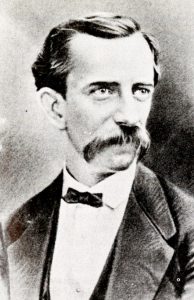 Portrait of J. Clarke Swayze, editor of the Topeka Daily Blade
Portrait of J. Clarke Swayze, editor of the Topeka Daily Blade
The harshest criticisms of the lottery came from the Topeka Daily Blade and its editor, J. Clarke Swayze. Almost from the moment the Library Aid Association was announced, the Daily Blade condemned the Aid Association, the lottery and everyone promoting it. Swayze was one of the first to point out that the Library Aid Association used the names of prominent Topekans, who it said supported the lottery, without their knowledge or consent. The Daily Blade also reported the sanction of the Library Association was never obtained. It was simply taken and used. Predictably, the date for the Grand Fair drawing came and went. The Aid Association gave no explanation as to why it was postponed, but ads listed March 31, 1876, as the new date for the fair. When that date, too, passed without a drawing, the cries of swindle and fraud became louder.
Demand for damages
The Library Association realized injury had already been done in our good name and decided to demand and receive damages from the Aid Association totaling $3,000. A verbal promise was made for an additional $2,000 worth of books if the lottery succeeded. The Library Board also asked the Aid Association release a statement saying the Library and the Aid Association were in no way connected. The promised statement from the Aid Association never appeared. Finally, on April 29, 1876, police arrested the managers of the Topeka Library Aid Association S.D. Macdonald, R.A. Barker and G.W. Bain and indicted them for using the United States Mails in operating an illegal lottery. All three were released on bail. Several public officials who had earlier been quoted as endorsing the lottery, including Governor Thomas A. Osborn, released a joint statement officially denying such statements and distancing them from the Aid Association entirely. To ensure a drawing would take place, the Governor appointed a committee to coordinate and oversee the drawing.
Public drawing
On June 8, 1876, almost 4 months after the Grand Fair was originally scheduled the Topeka Library Aid Association held a small program at Costa's Opera House. But instead of the promised public drawing, one of the members of the Governor's committee told the crowd the drawing had been held the night before behind closed doors. Over the cries of Thieves! Swindlers! Robbers! he announced the winning numbers. No one in the crowd held a winning ticket.

One of the many tickets sold by the Topeka Library Aid Association
In the end, those in charge of the Aid Association got off with a slap on the wrist. S.D. Macdonald and R.A. Baker pleaded guilty to misuse of the U.S. Mail, paid a fine of $100, and promptly fled the state. G.W. Bain died a few weeks before the drawing. All told, officials estimated the Topeka Library Aid Association brought in between $250,000 and $300,000 (or between $7 and $8 million today). Of that, the Topeka Library Association received only $4,350.
Personal attacks & murder
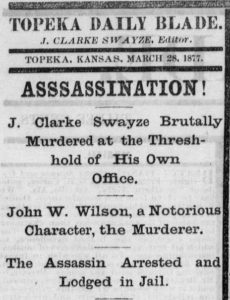
Headline from the Topeka Daily Blade announcing Swayze’s assassination (Mar. 28, 1877)
Although the Topeka Library Aid Association ended with a whimper, the lottery scandal had far-reaching implications. J. Clarke Swayze, editor of the Topeka Daily Blade, was particularly incensed by the injustice of the lottery. He wrote multiple stories daily that attacked both the Library Aid Association, and anyone associated with it. He trained his ire particularly on John W. Wilson, part owner and editor of the Topeka Weekly Times, which had promoted the lottery. The attacks became increasingly personal, until finally Wilson had had enough. On March 27, 1877, Wilson met Swayze as he was making his way back to the Daily Blade offices and shot him dead. A jury eventually found Wilson not guilty they believed he shot Swayze in self-defense.
Movement to a free library
On a more positive note, the Library Aid Association lottery scam can be credited with turning the Library Association into the Topeka & Shawnee County Public Library as we know it today. After the lottery debacle, membership numbers for the Topeka Library Association stagnated. The Topeka Daily Commonwealth suggested this could be because the library was not completely free and was dependent on others (meaning the lottery) for money. The Commonwealth stated if is made absolutely free to all by a tax which all pay” then the public would be more inclined to use it. This began the push for a free public library in Topeka.













